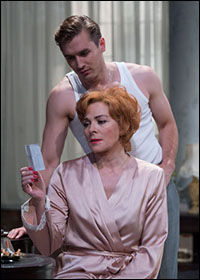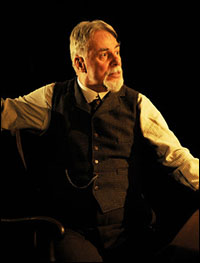
We forget, or may not know, that on both sides of the Atlantic, the musicians are auditioned before they're allowed to busk for us and only the best survive the rigorous selection methods. In New York, they even play on the platforms, which must be frustrating for them, as the noise of the trains drowns out their music.
A new trend has recently emerged of having star players testing the musical acumen of the passengers by playing incognito to see who stops and listens. Joshua Bell recently played Bach for an hour at a subway station in Washington DC as an experiment to see who would recognize quality and beauty when it wasn't labeled as such. A few people stopped briefly to listen and then hurried on. Only children, some as young as three, were truly enchanted by the vision of one of the world's greatest violinists, playing some of the world's greatest music. He earned $32. The previous evening he had played the same music at a sold-out concert where the tickets cost $100.
The London cast of the hit Tony award-winning musical Once have just done something similar, but with happier results. The entire cast, led by their star, Declan Bennett, became the first West End musical cast to busk on the London Underground. To celebrate the tenth anniversary of buskers on the tube, what we Londoners call the subway, the cast of Once spent two hours in Leicester Square station performing songs from the show alongside some of the station's regular buskers. From all accounts, they had a really good time.
Declan Bennett hasn't forgotten what life was like before he became a West End star. "As a singer-songwriter who has done my fair share of busking in the past, it was especially exciting today to have spent time at Leicester Square Tube with my fellow Once cast mates and some of London Underground's regular buskers. My role as the heartbroken busker 'Guy' in Once at the Phoenix Theatre is heavily inspired by my experiences before making the leap to become a professional performer. Today was a great way of reconnecting with that time."
It turns out that the London Underground licensed busking scheme currently fields around 170 to 200 active people, spread throughout 24 different stations. Who knew?
 |
||
| Kim Cattrall and Seth Numrich |
||
| Photo by Manuel Harlan |
Times were different then. The 20s did not, in fact, roar. Women were, if you believe O'Neill, saints or whores. At the core of Strange Interlude is Nina, who is neither, but O'Neill couldn't help condemning her for her sexual freedom and, as in so many of his other plays, the plot is about her manipulation of the men who love her. In truth, in Anne-Marie Duff's portrait of her, she is unacceptably hard and cold, her coolness exacerbating O'Neill's possible dislike of her. You may well ask why a playwright would write about so many women he didn't care for but, remember, not caring for is not the same as not caring about. In Strange Interlude more than perhaps in any of his greater plays, it is as if he genuinely has no idea, up to the end of the play, how Nina got to be the way she is, nor what the curiously flawed but beautiful woman will turn into, even after he's written it.
Not one but two professionals are credited in the Old Vic's printed program for Tennessee Williams' Sweet Bird of Youth with voice and dialect coaching but, except for the two leading roles, taken by Kim Cattrall and Seth Numrich, who are both Americans (although Cattrall was born in the UK), the Southern accents of the cast wouldn't fool a four-year old. My American guest was snorting with suppressed giggles as each new character failed to find the Deep South in their assorted voice boxes.
No matter. What you want to know is how Cattrall and Numrich measure up to the demands of this meditation on the aging process by the apparently washed-up former movie star and the beautiful young boy who unaccountably discovers that he is 29 years old and losing his looks with nothing to show for it. Cattrall's Alexandra Del Lago is unusally raddled and out of control to the extent that it's impossible to believe that she is still being cast in major movie roles. Numrich is certainly good-looking enough, but he plays the part as though he's trying to find himself rather than trying to find Heavenly, his hometown sweatheart. Heavenly, the daughter of the town Boss, is played rather creepily by Louise Dylan as though she were a ghost.
 |
||
| Barrie Rutter in Rutherford and Son. |
||
| Photo by Nobby Clark |
It was a rare woman who wrote plays in 1912 and Githa Sowerby was just such a woman. Rutherford and Son was an instant hit at London's Royal Court Theatre. Nothing she wrote subsequently approached the gritty realism of her first play, nor its success. She has since become a heroine of the women's movement. Only late in her life (she died in 1970 at the age of 93) did she explain that the character of the father was based on her own grandfather, a cruel man whose sons eventually wrested the glass factory from his control.
Barrie Rutter, who runs Northern Broadsides, a theatre company which produces Shakespeare and other classic drama using regional accents rather than the conventional pronounciation, plays the father, and the conviction in the acting comes from the entire company, even if sometimes the Northern dialect is a little difficult to follow. Americans who have occasional difficulty with accents from other parts of their diverse nation will sympathize.




-Matthew-Murphy.jpg)





